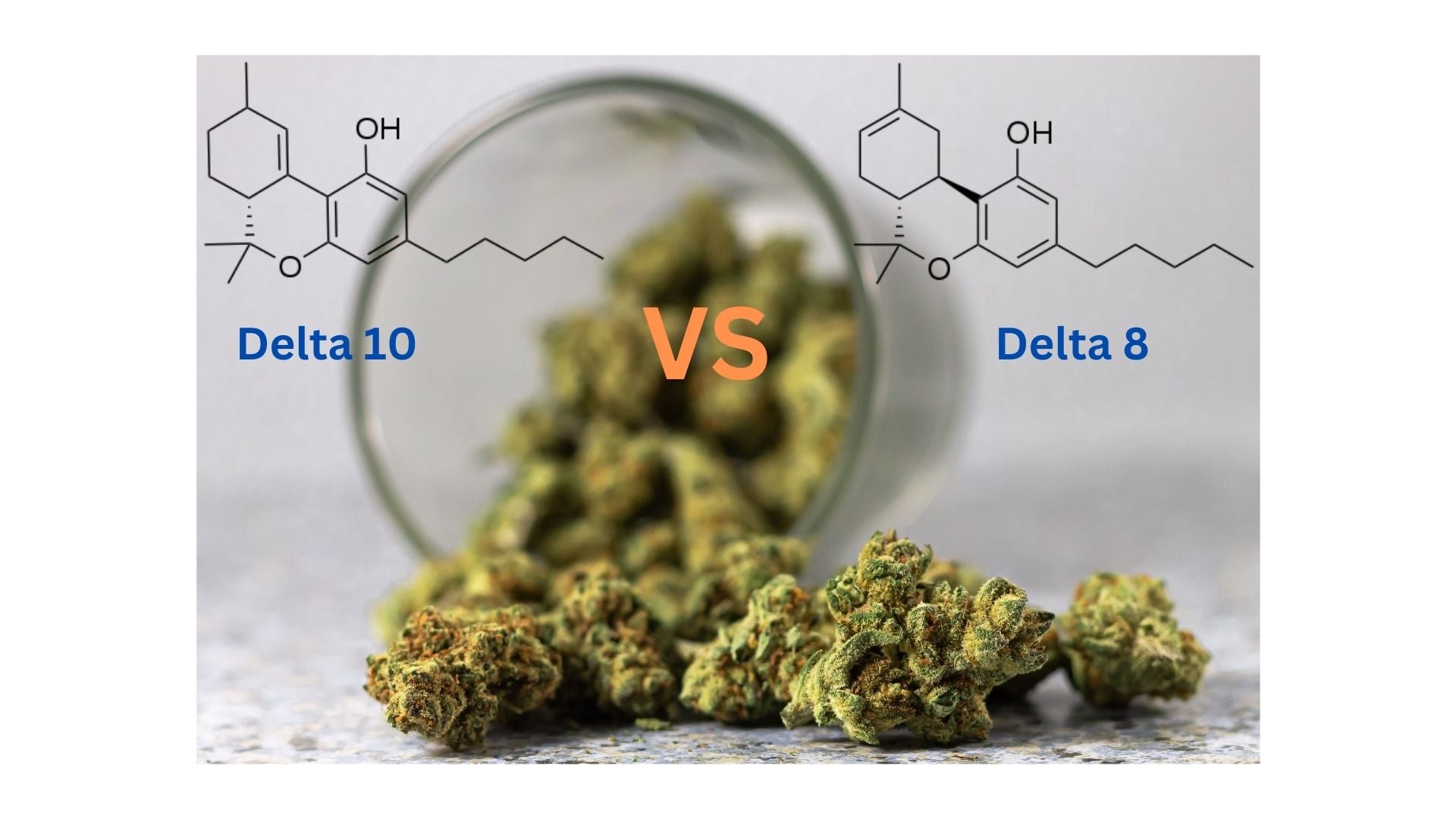Delta 8 Vs. Delta 10 Cannabis

The increasing popularity of cannabis consumption has led to the discovery and development of new products, such as Delta 8 and Delta 10. While these two cannabinoids are both derived from hemp plants, they offer different effects that impact consumers in various ways. In this article, we will explore the differences between Delta 8 and Delta 10, including their physical properties, potential health benefits, and legal status.
Delta 8 is a cannabinoid found naturally occurring within hemp plant materials like seeds and flowers. It can also be synthetically produced through the process of molecular isolation. This type of cannabis is known for its milder potency than traditional marijuana varieties due to its lower concentration of THC (tetrahydrocannabinol).
Consumers have reported feeling uplifted after using Delta 8 instead of experiencing paranoia or anxiety associated with high-THC products.
Additionally, it may provide stress relief without an overwhelming "high" sensation associated with other forms of cannabis use.
On the other hand, Delta 10 is a newer form of cannabis that is created by converting CBD (cannabidiol) into Δ10THC, which has similar effects to those experienced when consuming marijuana strains containing higher concentrations of THC.
However, unlike Delta 8, which offers more subtle highs, Delta 10 provides users with a stronger experience that can enhance creativity as well as produce feelings of euphoria.
The psychoactive effects typically last longer than those caused by consuming regular marijuana due to the increased levels of Δ10THC present in the product.
Definition Of Cannabinoids
Cannabinoids are chemical compounds found in marijuana plants, which interact with the body's endocannabinoid system to create a range of effects. These cannabis molecules can be naturally occurring or synthetically produced and have been studied for their potential therapeutic benefits.
Cannabinoids typically bind to cannabinoid receptors located throughout the brain and body to produce physiological changes that impact appetite, mood, sleep, pain perception, and more.
The two most well-known cannabinoids are delta-9 tetrahydrocannabinol (THC) and cannabidiol (CBD).
THC is responsible for producing the psychoactive "high" commonly associated with marijuana use, while CBD produces no intoxicating effects but has still been shown to have therapeutic properties when taken on its own or in combination with other cannabis compounds.
Other lesser-known cannabinoids include cannabinol (CBN), cannabigerol (CBG), cannabichromene (CBC), and delta 8-tetrahydrocannabinol (Delta 8 THC).
All these components play important roles in the overall effects of any given marijuana product. Moving forward, we'll explore different types of products that contain varying concentrations of these cannabinoids.
Different Types Of Cannabis Products
Cannabis comes in a range of different forms, from edibles, tinctures, and topicals.
With so many options available, it's important for consumers to understand what each product is used for before making their purchase.
- Edibles are typically food items that have been infused with cannabis oil or extract.
- Vaporizers heat up the cannabis flower or concentrate at low temperatures without burning it, releasing inhalable cannabinoids into the air.
- Concentrates are highly concentrated products made by extracting compounds like THC and CBD from plant material using solvents such as ethanol or butane.
- Tinctures are liquid extracts that can be administered orally or sublingually under the tongue.
- Topicals are creams and ointments which provide localized relief when applied directly onto the skin.
Each type of product presents its own unique benefits and drawbacks, so researching them thoroughly ahead of time is key to finding the right one for your needs.

In addition to these common types of cannabis products, there are two specific varieties—delta 8 and delta 10 THC—which differ slightly in terms of their properties.
Both offer distinct experiences that may appeal to certain users more than others; understanding these differences will make it easier to choose between them when shopping around for cannabis products.
Properties Of Delta 8 And Delta 10 Thc
Delta 8 and Delta 10 THC are two different forms of tetrahydrocannabinol (THC). Both have similar properties, but they differ in their levels of psychoactivity.
The primary difference between the two compounds is that Delta 8 has a lower level of THC than Delta 10 – around half as much. This means that while both varieties produce effects commonly associated with cannabis use, such as relaxation, euphoria, and altered perception, Delta 8 will be less potent when it comes to producing those effects.
Below are some key differences between Delta 8 and Delta 10:
* The THC content found in Delta 8 ranges from 7-14%, whereas the THC content found in Delta 10 is typically higher at up to 20%.
* While both products can provide therapeutic benefits, people who prefer milder effects may find more benefit from using Delta 8 over its stronger counterpart.
* Although users generally experience fewer side effects with delta 8 compared to delta 10 due to reduced potency, extra caution should still be taken when consuming either form since too high doses may lead to anxiety or paranoia.
* Effects produced by intake of either compound vary depending on individual tolerance levels, body chemistry, and other factors.
* Different strains of cannabis also contain varying amounts of each variety, so it's important to do research before trying one type over another.
These distinctions highlight how consumers must consider various aspects when deciding which product best suits their needs. As all individuals react differently to cannabinoids like THC, understanding these nuances can help ensure an optimal experience with either option.
Benefits Of Using Delta 8 And Delta 10 Thc
Delta 8 and Delta 10 THC offer a variety of benefits to users. Both cannabinoids are closely related, sharing many similar properties. However, they also have distinct characteristics that set them apart as well.
Delta 8 is an analog of Delta 9 THC with a lower potency level, while Delta 10 offers a higher potency level than its predecessor. When used together, the two compounds can provide enhanced therapeutic effects for patients seeking relief from pain or other ailments.
The potential benefits of using delta 8 and delta 10 thc include increased relaxation, improved moods, reduced anxiety levels, better sleep quality, and greater overall health.
Studies indicate that these cannabinoids may be beneficial in treating conditions such as chronic pain, PTSD-related symptoms, inflammation, nausea associated with chemotherapy treatments, and more.
Additionally, research suggests that both compounds could potentially help reduce seizures in some individuals and even act as antiemetics (anti-nausea medications).
Furthermore, studies have shown that delta 8 and delta 10 could increase appetite among those suffering from anorexia nervosa and cachexia syndrome (wasting disease), making it possible to consume the necessary nutrients needed for recovery.
Interestingly enough, delta 8 has been found to produce fewer psychoactive side effects than standard Delta 9 THC due to its lower potency level, which makes it ideal for those looking to enjoy cannabis without feeling overly sedated or impaired by traditional marijuana products.
On the other hand, Delta 10 offers a slightly stronger effect but still remains mild when compared to other popular forms of THC, like shatter or waxes available on the market today. The combination of these two minor cannabinoids provides users with a unique experience unlike any other form of cannabis consumption available today – all without sacrificing safety or efficacy.
Potential Side Effects Of Delta 8 And Delta 10 Thc
When considering cannabis products containing Delta 8 THC or Delta 10 THC, it's important to be aware of potential side effects. Though the two compounds are similar on a chemical level and produce a similar high, there is evidence that suggests that Delta 8 might have fewer adverse reactions than its cousin.
Common side effects associated with both forms of THC include dry mouth and eyes, increased heart rate, paranoia, anxiety, dizziness and headache. Additionally, users may experience decreased coordination as well as memory problems while under the influence of Delta 8 or Delta 10. It's best to start with small doses when trying any type of new product containing either form of cannabinoid to see how your body responds before consuming larger amounts. Taking too much at once could lead to an uncomfortable situation known as "greening out," which can cause extreme nausea and vomiting.
Frequently Asked Questions
What Is The Recommended Dosage Of Delta 8 And Delta 10 Thc?
When it comes to cannabis dosage, there are specific recommended dosages for Delta 8 and Delta 10 THC. Cannabis is one of the most popularly used recreational drugs in the world, and its usage has been increasing steadily over time.
Therefore, understanding the proper dosage of both Delta 8 and Delta 10 THC is important. The recommended dosage of delta 8 and delta 10 thc can vary depending on a variety of factors such as body weight, tolerance level, individual goals, current health conditions, etc.
In general terms, users should start with a low dose (1-3mg) and gradually increase their intake until they find the desired effect.
It's also worth noting that different types of cannabis products have differing levels of potency, so users should always check labels before using any product.
Furthermore, those who are new to cannabis or want to use higher doses should consult a doctor first before doing so in order to ensure safety and minimize potential side effects.
That said, when taken responsibly and within the prescribed guidelines set by your healthcare provider, Delta 8 and Delta 10 THC can be beneficial for various reasons, including pain relief, anxiety reduction, and improved sleep quality, among other benefits.
Are There Any Known Interactions Between Delta 8 And Delta 10 Thc And Other Medications?
It is important to understand the potential interactions between delta 8 and delta 10 THC and other medications when consuming cannabis products.
Delta 8 has been found to interact with some drugs, such as certain antidepressants and blood thinners, so it's essential to be aware of these interactions before taking any new medication while using cannabis.
Similarly, research suggests that there may be a risk of drug interactions with delta-10 THC, although this is still being studied.
In light of these potential interactions, it is recommended that individuals consult their healthcare provider prior to taking any new medication or supplement while also consuming marijuana products. It is particularly important for people who are already taking prescription medicines or supplements because they could potentially have adverse reactions if taken in combination with Delta 8 or Delta 10 THC.
Furthermore, those who are pregnant or breastfeeding should avoid using cannabis products altogether due to the potential unknown risks associated with them. Ultimately, understanding the possible interactions between cannabis-derived compounds like delta 8 and delta 10 THC and other substances can help ensure safe consumption practices.
Is Delta 8 And Delta 10 Thc Legal In My State?
Both Delta 8 and Delta 10 THC are gaining popularity in the cannabis market, but their legal status varies from state to state. To determine whether either type is legally available for purchase or consumption in your particular location, an understanding of each state's cannabis laws and regulations must be considered.
When it comes to determining delta 8 and delta 10 legality, there are a few key points that should be kept in mind. First, understand the local laws regarding marijuana use and possession; if recreational marijuana isn't allowed, then chances are you won't find any Delta 8 or Delta 10 products on the shelves at your local dispensary.
Additionally, some states have restrictions on certain types of cannabinoids like Delta 8 and Delta 10–and these rules may vary by municipality. It's important to research these regulations carefully before purchasing any product containing either cannabinoid.
The good news is that many online retailers provide detailed information about which states they ship to, so if local laws don't allow access to either Delta 8 or Delta 10 THC products, you can still order them online from reputable sources. Be sure to read up on all relevant federal and state-specific laws before deciding what's right for you when it comes to consuming Delta 8 or Delta 10 THC legally.
Are Delta 8 And Delta 10 Thc Products Tested For Safety And Potency?
The safety and potency of Delta 8 and Delta 10 THC products are a major concern for many cannabis consumers. As the demand for these compounds grows, it is important to ensure that they have been tested for quality before use.
Cannabis testing can be used to evaluate the purity, potency, and overall safety of delta-8 and delta-10 THC products.
Testing laboratories typically analyze samples from cannabis plants or hemp-derived extracts in order to determine their cannabinoid content levels.
At a minimum, it is essential that all Delta 8 and Delta 10 THC products undergo laboratory tests for pesticide residues, microbial contaminants, mycotoxins, heavy metals, terpenes, cannabinoids (including CBD), residual solvents, water activity/moisture content, and other potential impurities.
Additionally, potency testing should also be conducted on each batch of product to verify its advertised strength, as well as any, claimed health benefits associated with its use.
By taking the extra step of having their products tested by an accredited lab facility prior to sale or distribution, producers can provide peace of mind to potential buyers while ensuring compliance with state regulations.
This will help ensure consumer satisfaction with their purchases while helping them make informed decisions about their health and wellness when consuming cannabis products containing Delta 8 or Delta 10 THCs.
Are There Any Long-Term Health Risks Associated With Delta 8 And Delta 10 Thc Use?
The use of Delta 8 and Delta 10 THC products has become increasingly popular in recent years, prompting questions about the potential long-term health risks associated with their use. Many cannabis users are curious to know whether there may be any adverse effects on one's physical or mental health after prolonged consumption of these substances. To understand more about the possible impacts of consuming Delta 8 and Delta 10 THC, it is important to consider what we currently know about the safety profile of cannabis as a whole.
Cannabis itself has been used for medicinal and recreational purposes for centuries, yet its effects on human health remain largely unknown due to limited research being conducted in this field.
Research that has been conducted suggests that while short-term Cannabis use can have some beneficial effects, such as reducing pain, nausea, and anxiety, long-term usage could potentially lead to negative outcomes, including an increased risk of developing psychosis or schizophrenia.
It is, therefore, important to consider whether similar risks might apply when using delta 8 and delta 10 thc products over a longer period of time.
While studies into the specific long-term effects of these compounds are still relatively scarce, they nonetheless suggest that they could carry many of the same risks as those associated with other forms of cannabis use.
Conclusion
The debate surrounding the potential benefits of Delta 8 and Delta 10 THC has grown significantly in recent years. With the legalization of cannabis products, users are now able to explore different types of cannabinoids for various results.
While both these compounds have been found to be effective at providing therapeutic effects, it is important to understand their recommended dosage, any possible interactions with other medications, legal status in your state as well as safety and potency testing before use.
When compared side by side, Delta 8 THC appears to produce a more mild psychoactive effect than its counterpart Delta 10 THC.
This makes it an appealing option for those seeking a subtle yet enjoyable experience while using cannabis products. Additionally, due to its lower potency level when compared to Delta 9 THC, many consider it a safer alternative when considering long-term health risks associated with cannabinoid use.
Overall, making an informed decision on whether or not you should consume either Delta 8 or Delta 10 THC requires further research into each compound's properties and being aware of local laws regarding cannabis product usage.
Considering all available information will help ensure that those who experiment with either type of cannabinoid do so safely and responsibly.
Happy Airvaping


